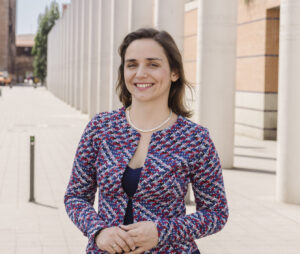Professor
Prof. Dr. Grażyna Baranowska
Institute for German, European and International Public Law
Chair of Migration Law and Human Rights
Schillerstraße 1
91054 Erlangen
E-Mail: grazyna.baranowska@fau.de
Office hours
By appointment
Short Bio
Professor Dr. Grażyna Baranowska has held the Chair of Migration Law and Human Rights at Friedrich-Alexander-Universität Erlangen-Nürnberg since August 2024. Her research focuses on disappeared persons, human rights violations at borders and memory laws.
Prior to that, she was a senior researcher at Hertie School’s Centre for Fundamental Rights, leding a project on missing migrants funded by the EU’s Marie Skłodowska-Curie Actions, and worked as an Assistant Professor at the Institute of Law Studies of the Polish Academy of Sciences. In the past she also worked for the Volkswagen Stiftung funded MEMOCRACY project (2021-2024), which scrutinizes the intersection of memory laws and democracy in Central and Eastern Europe, as well as the EU-funded project on Memory Laws in European and Comparative Perspective (2016-2019). Next to her academic work, she worked as policy advisor at the German Institute for Human Rights, and was involved in the process of drafting the General Comment on enforced disappearances and migration for the UN Committee on Enforced Disappearances. In 2022, she was appointed by the UN Human Rights Council as an independent expert of the UN Working Group on Enforced and Involuntary Disappearances.
Completed projects by Prof. Dr. Grażyna Baranowska:
– Missing Migrants: Identifying and Shaping Obligations for Protection, finanziert durch die Marie Skłodowska-Curie Individual Actions (MSCA-IF-2020) der EU (174.800 EUR), 2021-2024
– State obligations with regard to missing and disappeared persons under international law, finanziert durch das SONATA-Förderprogramm des Nationalen Wisschenschaftszentrums Polens (170.280 PLN; ca. 38.500 EUR), 2020-2023
– Protecting the memory of undemocratic regimes through memory laws, gefördert von der Stiftung Mercator durch Blickwechsel, ein Programm an der Humboldt-Universität, im Rahmen des Research Lab Verfassungspolitik in der Türkei II (3000 EUR), 02-07.2019
– Enforced disappearance in Europe: Development of legal standards, gefördert durch das PRELUDIUM-Förderprogramm des Polnischen Nationalen Wissenschaftszentrum (43.625 PLN; ca. 10.000 EUR), 2014-2016
Professor Baranowska was also involved in the following projects:
– Memocracy — The Challenge of Populist Memory Politics for Europe
– Memory Laws in European and Comparative Perspective | MELA
Professor Baranowska’s teaching focuses on human rights at the undergraduate and graduate levels.
So far, she has taught at the Hertie School in Berlin, the Polish Academy of Sciences, the University of Zurich and the Adam Mickiewicz University in Poznan. She has also been a guest lecturer at the Geneva Academy of International Humanitarian Law and Human Rights and at the University of Amsterdam.
In addition to her academic work, Ms. Baranowska also conducts training courses for lawyers and supports training programs of non-governmental organizations such as the Helsinki Foundation for Human Rights and Humanity in Action.
The current courses at the Friedrich-Alexander-Universität Erlangen-Nürnberg can be found here: Courses and lectures
The latest publications by Professor Baranowska:
2024
– “The Politics of Legal Facts: The Erasure of Pushback Evidence from the European Court of Human Rights,” (2024) Law & Social Inquiry (mit Alpes, M. J.)
– “The Impact of the United Nations Human Rights Treaties on the Domestic Level in Poland” in: Ch. Heyns and F. Viljoen (eds.), The Impact of the United Nations Human Rights Treaties on the Domestic Level. Second Revised Edition, Brill (mit K. Sękowska-Kozłowska, J. Grygiel, Ł. Szoszkiewicz)
– “Subjects and Actors” in: S. González Hauck, R. Kunz, M. Milas, Public International Law – A Multi-Perspective Approach, Chapter 7, Routledge (mit V. Engström, A. Green, R. Viswanath, T. P. Paige, J. T. Theilen, J. Santos de Carvalho, V. Kahl, H. Chi, S. González Hauck, A. Peters, R. Kunz)
– “International Human Rights Law” in: S. González Hauck, R. Kunz, M. Milas, Public International Law – A Multi-Perspective Approach, Chapter 21, Routledge (mit A. Ciampi, M. Milas, T. V. Ananthavinayagan, A. Rachovitsa, J. T. Theilen, V. Kahl, W. Arévalo-Ramírez, A. Rousset-Siri)
2023
– “Protecting the Good Name of the Nation as a Memory Law” (2023) European Constitution Law Review 19(4)
– “Exposing Covert Border Enforcement: Why Failing to Shift the Burden of Proof in Pushback Cases is Wrong” (2023), European Convention on Human Rights Law Review, 4 (4) 473-494.
– “How long does the past endure? “Continuing violations’ and the “very distant past’ before the UN Human Rights Committee” (2023) Netherlands Quarterly of Human Rights 41(2)
You can find a complete list of Professor Baranowksa’s publications here: List of publications – Prof. Dr. Grażyna Baranowska
Professor Baranowska has appeared in national and international media, commenting on current events and providing insights from her research:
– Podcast WeiterGedacht on the refugee challenges the EU is facing (29.03.2022, in English)
– Commentary at OKO.press on risks of exploitation of Ukrainian refugees in Poland (11.03.2022, in Polish)
– Debate following the screening of ‘Shadow Game’ (21.12.2021, in English)
– Panel ‘Europe’s deadly borders: Seeking protection in bordered Europe’ at the 2021 Berlin Human Rights Film Festival (20.09.2021, in English)
– Moderation of Ece Temelkuran’s key note at the 2021 Berlin Human Rights Film Festival (20.09.2021, in English)
– TV Interview on universal jurisdiction case in Switzerland in ARD Mittagsmagazin (19.09.2023, in German)
– Interview for Swiss Info on new UN mechanism missing persons in Syria (5.07.2023, in English)
– Interview on pushbacks at the Polish-Belarussian border (5.07.2023, in English)
– Interview on UN responses to enforced disappearances in TOK FM (17.10.2022, in Polish)
– Interview on separated families at the Mexico–United States border in TOK FM (25.11.2020, in Polish)
– Interview on enforced disappearances in TOK FM (25.10.2019, in Polish)